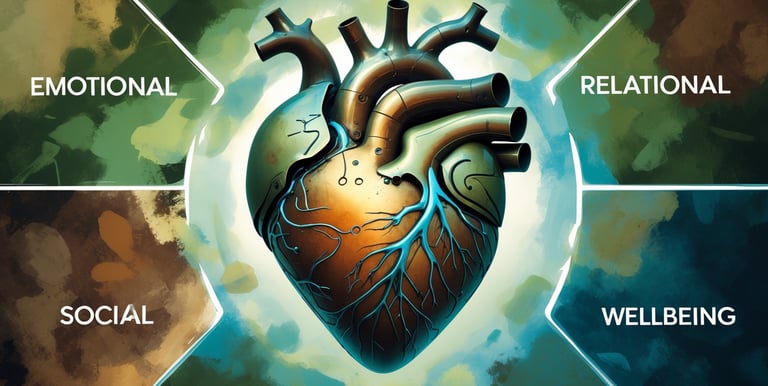Some Socio-Emotional Frameworks You Should Know
Understand some basic frameworks for relational health
4FORTITUDEE - EMOTIONAL, RELATIONAL, SOCIAL, COUNSELING


Some Socio-Emotional Frameworks and Ideas You Should Know
Introduction
Throughout history, human beings have sought frameworks to understand emotions, relationships, and social dynamics. From ancient philosophy to modern psychology, the pursuit of personal growth and interpersonal mastery remains a cornerstone of a meaningful life. This article explores key frameworks that enhance emotional intelligence, social skills, relational depth, and therapeutic interventions, providing a roadmap for personal development and human connection.
Emotional Frameworks
Emotional well-being is foundational to a fulfilling life. Mastering emotional intelligence enables individuals to navigate challenges, cultivate resilience, and foster meaningful interactions. Below are three essential frameworks for emotional mastery:
Emotional Intelligence (EI) by Daniel Goleman – Goleman’s framework emphasizes self-awareness, self-regulation, motivation, empathy, and social skills. By refining these areas, individuals improve decision-making, leadership, and interpersonal interactions.
Mindfulness-Based Stress Reduction (MBSR) – Developed by Jon Kabat-Zinn, MBSR integrates meditation and mindfulness practices to enhance emotional regulation and stress management. Regular mindfulness practice fosters greater clarity and emotional resilience.
Cognitive Behavioral Therapy (CBT) – A practical, evidence-based approach, CBT helps individuals identify negative thought patterns and reframe them, leading to healthier emotional responses and behaviors.
Social Skills Frameworks
Strong social skills enable individuals to build meaningful relationships, excel in professional environments, and navigate diverse social settings. These frameworks provide valuable insights:
Dale Carnegie’s How to Win Friends and Influence People – This classic book offers timeless principles for effective communication, relationship-building, and social influence, emphasizing genuine interest and active listening.
Social Intelligence by Daniel Goleman – Goleman extends his EI research to social intelligence, highlighting how attunement to others' emotions enhances communication, collaboration, and conflict resolution.
Assertiveness Training – Many individuals struggle to express their needs and boundaries effectively. Assertiveness training equips individuals with the skills to communicate with confidence, balancing self-respect and respect for others.
Relational Frameworks
Relationships form the bedrock of human experience, and understanding relational dynamics fosters deeper, more fulfilling connections. These frameworks provide essential guidance:
John Gottman’s Sound Relationship House Theory – Gottman’s research-based model highlights key elements of successful relationships, including trust, commitment, and constructive conflict resolution.
The Five Love Languages by Gary Chapman – Chapman’s framework identifies five distinct ways people express and receive love—words of affirmation, acts of service, receiving gifts, quality time, and physical touch—offering insights into relationship harmony.
Relational Life Therapy (RLT) by Terry Real – RLT addresses relational challenges by integrating deep emotional work, personal responsibility, and direct communication, promoting healthier partnerships.
Counseling and Therapy Frameworks
Therapeutic interventions provide structured support for emotional and psychological well-being. These evidence-based approaches guide individuals through personal challenges:
Cognitive Behavioral Therapy (CBT) – As noted earlier, CBT remains a cornerstone of modern therapy, helping individuals develop healthier thought and behavior patterns.
Acceptance and Commitment Therapy (ACT) – ACT encourages individuals to accept their emotions rather than suppress them, aligning actions with deeply held values for personal fulfillment.
Dialectical Behavior Therapy (DBT) – Originally developed for borderline personality disorder, DBT integrates mindfulness, distress tolerance, emotional regulation, and interpersonal effectiveness to support emotional stability.
Narrative Therapy – This approach helps individuals reshape their personal narratives, empowering them to view life events from a place of strength and growth.
Wellbeing Frameworks
Structured approaches to wellbeing provide practical, evidence-based methods for optimizing physical, mental, emotional, and social health. These frameworks serve as guiding models for personal resilience and long-term fulfillment:
The PERMA Model (Positive Psychology) – Developed by Martin Seligman, this framework emphasizes five core elements of wellbeing: Positive Emotion, Engagement, Relationships, Meaning, and Accomplishment, fostering a fulfilling and purpose-driven life.
Maslow’s Hierarchy of Needs – A tiered model of human motivation, where basic physiological and safety needs must be met before achieving higher levels of psychological and self-fulfillment needs, including self-actualization.
The Biopsychosocial Model – Integrates biological, psychological, and social factors to assess and improve overall wellbeing, recognizing the interconnected nature of health.
Self-Determination Theory (SDT) – Focuses on the intrinsic psychological needs of Autonomy, Competence, and Relatedness as essential for motivation, growth, and personal wellbeing.
The Wheel of Wellness (Myers, Sweeney, & Witmer) – A holistic model that incorporates spirituality, self-direction, work & leisure, friendship, and love, recognizing wellbeing as a dynamic, life-long process.
The Salutogenic Model (Antonovsky) – Shifts focus from illness to health by emphasizing Sense of Coherence (SOC): Comprehensibility, Manageability, and Meaningfulness, enabling individuals to thrive despite challenges.
The Six Dimensions of Wellness (Hettler) – A balanced approach identifying six interconnected dimensions: Physical, Emotional, Intellectual, Social, Spiritual, and Occupational Wellness, promoting a proactive and integrative lifestyle.
Resilience Theory (Richardson) – Defines resilience as the ability to recover, adapt, and grow in response to adversity, emphasizing protective factors, coping mechanisms, and personal development to maintain long-term wellbeing.
Conclusion
These frameworks serve as powerful tools for self-improvement and interpersonal mastery. Whether refining emotional intelligence, enhancing social skills, strengthening relationships, or seeking therapeutic support, integrating these ideas can lead to profound personal growth. By embracing these principles, individuals cultivate resilience, build meaningful connections, and create a more fulfilling life. What steps can you take today to enhance your emotional and relational well-being?
